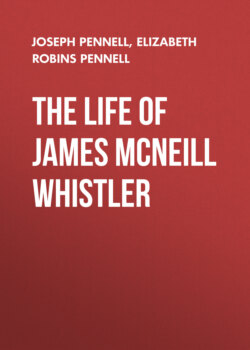Читать книгу The Life of James McNeill Whistler - Joseph Pennell - Страница 12
На сайте Литреса книга снята с продажи.
HEAD OF AN OLD MAN SMOKING
ОглавлениеTable of Contents
OIL
In the Musée du Luxembourg
(See page 52)
Whistler looked back to West Point with equal affection. He failed, but West Point was the basis of his code of conduct. As a "West Point man" he met every emergency, and his bearing, his carriage, showed the influence of those days when he liked to look back to himself "very dandy in grey." For the discipline, the tradition, the tone of the Academy he never lost his respect. He knew what it could do in making men of boys. "From the moment we came," he said to us, "we were United States officers, not schoolboys, not college students. We were ruled, not by little school or college rules, but by our honour, by our deference to the unwritten law of tradition." He resented the least innovation that threatened the hold of this tradition over the cadets. "To take a cadet into court was destruction to the morale of West Point; it was such a disgrace to offend against the unwritten laws that the offender's career was ruined." In the most trivial matters he deplored deviation from the old standard. That was the reason of his indignation when he heard that cadets were playing football, and, worse, playing against college teams; to put themselves on the level of students "was beneath the dignity of officers of the United States." During our war with Spain, and the Boers' struggle in South Africa, there was not an event, not a rumour, that he did not refer to West Point and its code. The Spanish War, though, "no doubt, we should never have gone into it, was the most wonderful, the most beautiful war since Louis XIV. Never in modern times has there been such a war; it was conducted on correct West Point principles, with the most perfect courtesy and dignity on both sides, and the greatest chivalry." When he came back to London from Corsica in 1901, and was telling us of the people and the way they clung to old custom and ceremonial, he said that he had found "the Roman tradition almost as fine as the West Point tradition," and this was a concession. We never knew him to show the least desire to return to Lowell or Stonington, to Pomfret or Washington, but he said, "If I ever make the journey to America, I will go straight to Baltimore, then to West Point, and then sail for England again." One evening we asked him to meet an officer just from West Point. His interest could not have been keener, had he left the Academy the day before. He wanted to know about everything—the buildings, the life, the discipline. He deplored every innovation, always, above all, football: West Point to him was in danger when cadets could stoop to dispute "with college students for a dirty ball kicked round a muddy field." This was the shadow thrown over his pleasure when he heard of the pride the Academy took in claiming him, of his reputation there, of his drawings hanging in places of honour. It was the military side of the Academy, however, that stirred him to enthusiasm. His face fell when, asking the officer, who, like Major Whistler, was in the artillery, "Professor of Tactics, I suppose?" the officer answered, "No, of French." He showed his affection for the Military Academy by sending to the library a copy of Whistler v. Ruskin: Art and Art Critics, with autograph notes and on the title-page the inscription: "From an old cadet whose pride it is to remember his West Point days." This is signed with the butterfly, and newspaper cuttings about the trial are pasted at the end of the book. The authorities at West Point have honoured him by placing a memorial tablet, one of St. Gaudens' last works, in the library of the Academy, and at the suggestion of the late Major Zalinski, a number of American artists have given a series of works to the Academy in his honour. In this collection Whistler alone is not represented, we believe.
But it needs more than respect and love for the Military Academy to make a soldier, and Whistler, like Poe before him, was an alien at West Point. It was no question of the number of his demerits, or of his ignorance of chemistry and history; he had something else to do in life.
